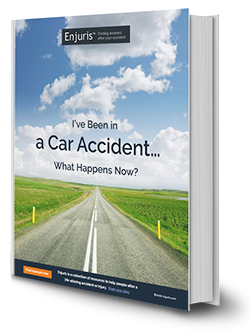Here’s what you need to know about New Hampshire laws and insurance requirements
A car accident could leave you with nothing more than a scratched bumper—or it could have a life-changing outcome. Either way, you have rights as a victim. Here’s how you know where to turn and what to do if you’ve been in an accident.
It can sometimes feel as though much of our lives involve calculated risks. Particularly coming out of a global pandemic, people make choices every day about how they want to live based on what the perceived risk is for a particular situation.
While you might not be willing to take on the level of risk of activities like skydiving, bungee jumping, or swimming with sharks, there’s one risk you likely take pretty regularly: Riding in a car.
The National Highway Traffic Safety Administration reports that the average U.S. driver will be involved in three to four car crashes in their lifetime; insurance companies report that a crash is likely every 17 to 18 years. Fortunately, the vast majority of car crashes do not result in severe injuries or fatalities.
Even so, if you’re in a New Hampshire car accident, you likely want to know how you can receive compensation for your losses. Each state’s laws are different for recovering compensation, so it’s crucial to understand your own state rules and regulations to move forward in the process.
New Hampshire car accident laws
New Hampshire auto insurance requirements
There are two ways to meet requirements to legally drive in New Hampshire:
- By purchasing auto insurance; or
- By meeting a state standard for financial responsibility for an accident.
The majority of drivers will opt for insurance so they are not bound to paying out of pocket for costs related to an accident.
A New Hampshire car insurance policy must include a minimum of 25/50/25 liability coverage:
- Bodily injury for medical treatment expenses, pain and suffering, and other costs to the victims as related to the accident. This is between $25,000 per person and $50,000 for the total of the accident.
- Property damage of $25,000.
- Uninsured motorist bodily injury for victims of an uninsured driver.
- Med Pay for your own medical treatment after a crash, regardless of fault, at a minimum of $1,000.
A New Hampshire insurer is required to offer certain other types of coverage and they are optional for the driver:
- Collision, to repair or replace your own vehicle after a crash
- Comprehensive, which is damage to your vehicle other than a crash. This includes vandalism, theft, fire, hail, etc.
- Towing and labor, if you require roadside assistance
- Rental reimbursement or transportation costs if your vehicle requires time for repairs
New Hampshire is an “at-fault” state
In an at-fault state, the person who causes the accident is responsible for paying costs associated with the accident. This is also called a "tort state." Therefore, the most important part of receiving compensation after an accident is to make a determination of fault.
The insurance companies or lawyers will negotiate the amount of liability by each party, and this will affect the amount of compensation you receive (or how much you have to pay if you’re the at-fault driver).
New Hampshire comparative negligence law
Each state follows one of four rules for how negligence is assigned. In New Hampshire, you may file a lawsuit even if you were partially liable for your own injuries.
The New Hampshire modified comparative negligence law allows a plaintiff (injured person) to file a lawsuit even if they are partially responsible for their own injuries. However, this is only true if the plaintiff is 50% or less responsible for the injuries. Your compensation award would be reduced according to your percentage of fault.
How does this work?
Jed was visiting New Hampshire at the height of the leaf-peeping season. He’d spent a lovely evening at a bed and breakfast on Summer Street in Bristol and was headed to the Sugar Hill State Forest for some hiking the next morning.
However, he decided to make a pit stop at a cozy coffee shop before heading to the park. There wasn’t too much traffic in the sleepy little center of town and Jed was checking a few texts as he headed down Summer Street, intending to turn left onto Central Square Street.
But just as he was about to turn, he was placing his phone in the cup holder when Toby approached from the opposite direction. Toby was speeding and swerved, crossing over the wide median in the road. He hit Jed’s car head-on and Jed was seriously injured.
Jed sued Toby for his injuries. The court found that although Toby caused the crash, Jed was partially liable because if he had not been fumbling with his phone at the time (though he was not actually texting), he would have seen Toby approaching sooner and could have swerved out of the way, thereby avoiding an accident. Therefore, Toby was 80% liable and Jed was 20% liable.
The total amount of Jed’s damages was $100,000. Based on his share of comparative negligence, his award was reduced by his 20% liability and he recovered $80,000 in costs.
New Hampshire car accident statute of limitations
The statute of limitations is a state law that sets a deadline for when you must file a lawsuit.
If you were involved in a New Hampshire car accident, you have three years from the date of the crash in which to file a claim. If you miss the deadline, the court will likely refuse your case. If the claimant is a minor, they may file a claim until their 20th birthday.
The statute of limitations applies only to lawsuits, not insurance payouts. Most insurance companies have short periods of time in which you’re required to file a claim. Your time period depends on the company’s policy. If you’re in an accident and need to file a claim, you should turn first to insurance and call the insurer as soon as possible following the event.
New Hampshire car accident reporting requirements
New Hampshire law requires that a driver involved in a traffic accident must report the crash to the Division of Motor Vehicles within 15 days after the crash if any person was injured or killed or if there was property damage of $1,000 or more. If a police report is made, the driver does not need to separately report the accident.
Can I file a car accident lawsuit in New Hampshire?
Usually, yes. But you likely don’t have to.
There are two reasons why you might need or want to file a New Hampshire car accident lawsuit:
- The amount of damages exceeds the at-fault driver’s insurance policy limits; or
- The insurance companies can’t reach an agreement on liability or damages.
If you can’t recover the amount of compensation you believe you deserve for these or other reasons, you can (and should) call a qualified, experienced New Hampshire personal injury lawyer.
Your lawyer will either negotiate with the insurance companies or file a lawsuit in order to recover your costs associated with the accident. Their job is to minimize your share of liability, review the evidence at the scene (or discover additional evidence) to determine exactly how the accident happened, and calculate the exact amount of costs that you’re owed as related to the accident.
You can recover damages for medical treatment, lost wages, future costs, pain and suffering, and other expenses related to your mental and physical health.
Don’t shortchange yourself by accepting a lowball insurance settlement offer; it’s always a good idea to consult a lawyer to ensure you’re receiving the accident damage award that you deserve.
Still not finding what you need?
Check out our other articles on auto accidents in New Hampshire.
Did you know that car accident law varies by state?
Hurt in a car crash? You may find these resources helpful
Need a lawyer?
What does an injury lawyer do?
A personal injury lawyer helps individuals who have sustained injuries in accidents to recover financial compensation. These funds are often needed to pay for medical treatment, make up for lost wages and provide compensation for injuries suffered. Sometimes a case that seems simple at first may become more complicated. In these cases, consider hiring an experienced personal injury lawyer. Read more
Common car accidents





















